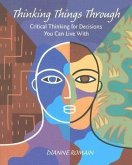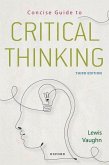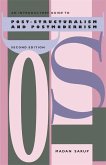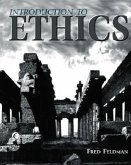Vincent Ryan Ruggiero
Beyond Feelings: A Guide to Critical Thinking
Vincent Ryan Ruggiero
Beyond Feelings: A Guide to Critical Thinking
- Broschiertes Buch
- Merkliste
- Auf die Merkliste
- Bewerten Bewerten
- Teilen
- Produkt teilen
- Produkterinnerung
- Produkterinnerung
This succinct, interdisciplinary introduction to critical thinking successfully dares students to question their own assumptions and to enlarge their thinking through the analysis of the most common problems associated with everyday reasoning. The text offers a unique and effective organization: Part I explains the fundamental concepts; Part II describes the most common barriers to critical thinking; Part III offers strategies for overcoming those barriers.
Andere Kunden interessierten sich auch für
![Thinking Well: An Introduction to Critical Thinking with Free Critical Thinking Powerweb Thinking Well: An Introduction to Critical Thinking with Free Critical Thinking Powerweb]() Stewart KellyThinking Well: An Introduction to Critical Thinking with Free Critical Thinking Powerweb95,99 €
Stewart KellyThinking Well: An Introduction to Critical Thinking with Free Critical Thinking Powerweb95,99 €![What Is the Argument?: Critical Thinking in the Real World [With Access to Powerweb Card] What Is the Argument?: Critical Thinking in the Real World [With Access to Powerweb Card]]() Steven P. LeeWhat Is the Argument?: Critical Thinking in the Real World [With Access to Powerweb Card]111,99 €
Steven P. LeeWhat Is the Argument?: Critical Thinking in the Real World [With Access to Powerweb Card]111,99 €![Pathways for Remembering and Recognizing Indigenous Thought in Education Pathways for Remembering and Recognizing Indigenous Thought in Education]() Sandra StyresPathways for Remembering and Recognizing Indigenous Thought in Education47,99 €
Sandra StyresPathways for Remembering and Recognizing Indigenous Thought in Education47,99 €![Thinking Things Through: Critical Thinking for Decisions You Can Live with Thinking Things Through: Critical Thinking for Decisions You Can Live with]() Dianne RomainThinking Things Through: Critical Thinking for Decisions You Can Live with94,99 €
Dianne RomainThinking Things Through: Critical Thinking for Decisions You Can Live with94,99 €![Concise Guide to Critical Thinking Concise Guide to Critical Thinking]() Lewis VaughnConcise Guide to Critical Thinking72,99 €
Lewis VaughnConcise Guide to Critical Thinking72,99 €![An Introductory Guide to Post-Structuralism and Postmodernism, 2nd Ed. An Introductory Guide to Post-Structuralism and Postmodernism, 2nd Ed.]() Madan SarupAn Introductory Guide to Post-Structuralism and Postmodernism, 2nd Ed.35,99 €
Madan SarupAn Introductory Guide to Post-Structuralism and Postmodernism, 2nd Ed.35,99 €![Lsc Cps1 (): Lsc Cps1 Intro to Ethics Lsc Cps1 (): Lsc Cps1 Intro to Ethics]() FeldmanLsc Cps1 (): Lsc Cps1 Intro to Ethics80,99 €
FeldmanLsc Cps1 (): Lsc Cps1 Intro to Ethics80,99 €-
-
-
This succinct, interdisciplinary introduction to critical thinking successfully dares students to question their own assumptions and to enlarge their thinking through the analysis of the most common problems associated with everyday reasoning. The text offers a unique and effective organization: Part I explains the fundamental concepts; Part II describes the most common barriers to critical thinking; Part III offers strategies for overcoming those barriers.
Hinweis: Dieser Artikel kann nur an eine deutsche Lieferadresse ausgeliefert werden.
Hinweis: Dieser Artikel kann nur an eine deutsche Lieferadresse ausgeliefert werden.
Produktdetails
- Produktdetails
- Verlag: McGraw Hill LLC
- 9th edition
- Seitenzahl: 256
- Erscheinungstermin: 8. Februar 2011
- Englisch
- Abmessung: 225mm x 157mm x 10mm
- Gewicht: 332g
- ISBN-13: 9780078038181
- ISBN-10: 0078038189
- Artikelnr.: 32463507
- Herstellerkennzeichnung
- Libri GmbH
- Europaallee 1
- 36244 Bad Hersfeld
- gpsr@libri.de
- Verlag: McGraw Hill LLC
- 9th edition
- Seitenzahl: 256
- Erscheinungstermin: 8. Februar 2011
- Englisch
- Abmessung: 225mm x 157mm x 10mm
- Gewicht: 332g
- ISBN-13: 9780078038181
- ISBN-10: 0078038189
- Artikelnr.: 32463507
- Herstellerkennzeichnung
- Libri GmbH
- Europaallee 1
- 36244 Bad Hersfeld
- gpsr@libri.de
Vincent Ryan Ruggiero is internationally recognized as a pioneer in the movement to make creative and critical thinking central emphases in education and in society. The author of 22 books and over 500 essays, he is Professor of Humanities Emeritus at State University of New York, Delhi.
Preface
Introduction
PART I. THE CONTEXT
1. Who Are You?
The Influence of Time and Place
The Influence of Ideas
The Influence of Mass Culture
The "Science" of Manipulation
The Influence of Psychology
Becoming an Individual
2. What Is Critical Thinking?
Mind, Brain, or Both?
Critical Thinking Defined
Characteristics of Critical Thinkers
The Role of Intuition
The Basic Activities of Critical Thinking
Critical Thinking and Writing
Critical Thinking and Discussion
Avoiding Plagiarism
3. What Is Truth?
Where Does It All Begin?
Imperfect Perception
Imperfect Memory
Deficient Information
Even the Wisest Can Err
Truth Is Discovered, Not Created
4. What Does It Mean to Know?
Requirements of Knowing
Testing Your Own Knowledge
How We Come to Know
Why Knowing is Difficult
A Cautionary Tail
Is Faith a Form of Knowledge
Obstacles to Knowledge
5. How Good Are Your Opinions?
Opinions Can Be Mistaken
Opinions on Moral Issues
Even Experts Can Be Wrong
Kinds of Errors
Informed Versus Uninformed Opinion
Forming Opinions Responsibly
6. What Is Evidence?
Kinds of Evidence
Evaluating Evidence
What Constitutes "Sufficient" Evidence?
7. What Is Argument?
The Parts of an Argument
Evaluating Arguments
More Difficult Arguments
PART II. THE PITFALLS
8. The Basic Problem: "Mine Is Better"
Egocentric People
Ethnocentric People
Controlling "Mine-Is-Better" Thinking
9. Errors of Perspective
Poverty of Aspect
Unwarranted Assumptions
The Either/Or Outlook
Mindless Conformity
Absolutism
Relativism
Bias For or Against Change
10. Errors of Procedure
Biased Consideration of Evidence
Double Standard
Hasty Conclusion
Overgeneralization and Stereotyping
Oversimplification
The Post Hoc Fallacy
11. Errors of Expression
Contradiction
Arguing in a Circle
Meaningless Statement
Mistaken Authority
False Analogy
Irrational Appeal
12. Errors of Reaction
Automatic Rejection
Changing the Subject
Shifting the Burden of Proof
"Straw Man"
Attacking the Critic
13. The Errors in Combination
Errors of Perspective
Errors of Procedure
Errors of Expression
Errors of Reaction
Sample Combinations of Errors
A Sensible View of Terminology
PART III. A STRATEGY
14. Knowing Yourself
Critical Thinking Inventory
Using Your Inventory
Challenge and Reward
15. Being Observant
Observing People
Observation in Science and Medicine
The Range of Application
Becoming More Observant
Reflecting Your Observations
16. Selecting an Issue
The Basic Rule: Less Is More
How to Limit an Issue
Sample Issue: Pornography
Sample Issue: Boxing
Sample Issue: Juvenile Crime
Narrowing the Issue Further
17. Conducting Inquiry
Working with Inconclusive Results
Where to Look for Information
Keeping Focused
How Much Inquiry is Enough?
Managing Lengthy Material
18. Forming a Judgment
Evaluating Evidence
Evaluating Your Sources' Arguments
Making Important Distinctions
Expressing Judgments
19. Persuading Others
Guidelines for Persuasion
An Unpersuasive Presentation
A Persuasive Presentation
Notes
Index
Introduction
PART I. THE CONTEXT
1. Who Are You?
The Influence of Time and Place
The Influence of Ideas
The Influence of Mass Culture
The "Science" of Manipulation
The Influence of Psychology
Becoming an Individual
2. What Is Critical Thinking?
Mind, Brain, or Both?
Critical Thinking Defined
Characteristics of Critical Thinkers
The Role of Intuition
The Basic Activities of Critical Thinking
Critical Thinking and Writing
Critical Thinking and Discussion
Avoiding Plagiarism
3. What Is Truth?
Where Does It All Begin?
Imperfect Perception
Imperfect Memory
Deficient Information
Even the Wisest Can Err
Truth Is Discovered, Not Created
4. What Does It Mean to Know?
Requirements of Knowing
Testing Your Own Knowledge
How We Come to Know
Why Knowing is Difficult
A Cautionary Tail
Is Faith a Form of Knowledge
Obstacles to Knowledge
5. How Good Are Your Opinions?
Opinions Can Be Mistaken
Opinions on Moral Issues
Even Experts Can Be Wrong
Kinds of Errors
Informed Versus Uninformed Opinion
Forming Opinions Responsibly
6. What Is Evidence?
Kinds of Evidence
Evaluating Evidence
What Constitutes "Sufficient" Evidence?
7. What Is Argument?
The Parts of an Argument
Evaluating Arguments
More Difficult Arguments
PART II. THE PITFALLS
8. The Basic Problem: "Mine Is Better"
Egocentric People
Ethnocentric People
Controlling "Mine-Is-Better" Thinking
9. Errors of Perspective
Poverty of Aspect
Unwarranted Assumptions
The Either/Or Outlook
Mindless Conformity
Absolutism
Relativism
Bias For or Against Change
10. Errors of Procedure
Biased Consideration of Evidence
Double Standard
Hasty Conclusion
Overgeneralization and Stereotyping
Oversimplification
The Post Hoc Fallacy
11. Errors of Expression
Contradiction
Arguing in a Circle
Meaningless Statement
Mistaken Authority
False Analogy
Irrational Appeal
12. Errors of Reaction
Automatic Rejection
Changing the Subject
Shifting the Burden of Proof
"Straw Man"
Attacking the Critic
13. The Errors in Combination
Errors of Perspective
Errors of Procedure
Errors of Expression
Errors of Reaction
Sample Combinations of Errors
A Sensible View of Terminology
PART III. A STRATEGY
14. Knowing Yourself
Critical Thinking Inventory
Using Your Inventory
Challenge and Reward
15. Being Observant
Observing People
Observation in Science and Medicine
The Range of Application
Becoming More Observant
Reflecting Your Observations
16. Selecting an Issue
The Basic Rule: Less Is More
How to Limit an Issue
Sample Issue: Pornography
Sample Issue: Boxing
Sample Issue: Juvenile Crime
Narrowing the Issue Further
17. Conducting Inquiry
Working with Inconclusive Results
Where to Look for Information
Keeping Focused
How Much Inquiry is Enough?
Managing Lengthy Material
18. Forming a Judgment
Evaluating Evidence
Evaluating Your Sources' Arguments
Making Important Distinctions
Expressing Judgments
19. Persuading Others
Guidelines for Persuasion
An Unpersuasive Presentation
A Persuasive Presentation
Notes
Index
Preface
Introduction
PART I. THE CONTEXT
1. Who Are You?
The Influence of Time and Place
The Influence of Ideas
The Influence of Mass Culture
The "Science" of Manipulation
The Influence of Psychology
Becoming an Individual
2. What Is Critical Thinking?
Mind, Brain, or Both?
Critical Thinking Defined
Characteristics of Critical Thinkers
The Role of Intuition
The Basic Activities of Critical Thinking
Critical Thinking and Writing
Critical Thinking and Discussion
Avoiding Plagiarism
3. What Is Truth?
Where Does It All Begin?
Imperfect Perception
Imperfect Memory
Deficient Information
Even the Wisest Can Err
Truth Is Discovered, Not Created
4. What Does It Mean to Know?
Requirements of Knowing
Testing Your Own Knowledge
How We Come to Know
Why Knowing is Difficult
A Cautionary Tail
Is Faith a Form of Knowledge
Obstacles to Knowledge
5. How Good Are Your Opinions?
Opinions Can Be Mistaken
Opinions on Moral Issues
Even Experts Can Be Wrong
Kinds of Errors
Informed Versus Uninformed Opinion
Forming Opinions Responsibly
6. What Is Evidence?
Kinds of Evidence
Evaluating Evidence
What Constitutes "Sufficient" Evidence?
7. What Is Argument?
The Parts of an Argument
Evaluating Arguments
More Difficult Arguments
PART II. THE PITFALLS
8. The Basic Problem: "Mine Is Better"
Egocentric People
Ethnocentric People
Controlling "Mine-Is-Better" Thinking
9. Errors of Perspective
Poverty of Aspect
Unwarranted Assumptions
The Either/Or Outlook
Mindless Conformity
Absolutism
Relativism
Bias For or Against Change
10. Errors of Procedure
Biased Consideration of Evidence
Double Standard
Hasty Conclusion
Overgeneralization and Stereotyping
Oversimplification
The Post Hoc Fallacy
11. Errors of Expression
Contradiction
Arguing in a Circle
Meaningless Statement
Mistaken Authority
False Analogy
Irrational Appeal
12. Errors of Reaction
Automatic Rejection
Changing the Subject
Shifting the Burden of Proof
"Straw Man"
Attacking the Critic
13. The Errors in Combination
Errors of Perspective
Errors of Procedure
Errors of Expression
Errors of Reaction
Sample Combinations of Errors
A Sensible View of Terminology
PART III. A STRATEGY
14. Knowing Yourself
Critical Thinking Inventory
Using Your Inventory
Challenge and Reward
15. Being Observant
Observing People
Observation in Science and Medicine
The Range of Application
Becoming More Observant
Reflecting Your Observations
16. Selecting an Issue
The Basic Rule: Less Is More
How to Limit an Issue
Sample Issue: Pornography
Sample Issue: Boxing
Sample Issue: Juvenile Crime
Narrowing the Issue Further
17. Conducting Inquiry
Working with Inconclusive Results
Where to Look for Information
Keeping Focused
How Much Inquiry is Enough?
Managing Lengthy Material
18. Forming a Judgment
Evaluating Evidence
Evaluating Your Sources' Arguments
Making Important Distinctions
Expressing Judgments
19. Persuading Others
Guidelines for Persuasion
An Unpersuasive Presentation
A Persuasive Presentation
Notes
Index
Introduction
PART I. THE CONTEXT
1. Who Are You?
The Influence of Time and Place
The Influence of Ideas
The Influence of Mass Culture
The "Science" of Manipulation
The Influence of Psychology
Becoming an Individual
2. What Is Critical Thinking?
Mind, Brain, or Both?
Critical Thinking Defined
Characteristics of Critical Thinkers
The Role of Intuition
The Basic Activities of Critical Thinking
Critical Thinking and Writing
Critical Thinking and Discussion
Avoiding Plagiarism
3. What Is Truth?
Where Does It All Begin?
Imperfect Perception
Imperfect Memory
Deficient Information
Even the Wisest Can Err
Truth Is Discovered, Not Created
4. What Does It Mean to Know?
Requirements of Knowing
Testing Your Own Knowledge
How We Come to Know
Why Knowing is Difficult
A Cautionary Tail
Is Faith a Form of Knowledge
Obstacles to Knowledge
5. How Good Are Your Opinions?
Opinions Can Be Mistaken
Opinions on Moral Issues
Even Experts Can Be Wrong
Kinds of Errors
Informed Versus Uninformed Opinion
Forming Opinions Responsibly
6. What Is Evidence?
Kinds of Evidence
Evaluating Evidence
What Constitutes "Sufficient" Evidence?
7. What Is Argument?
The Parts of an Argument
Evaluating Arguments
More Difficult Arguments
PART II. THE PITFALLS
8. The Basic Problem: "Mine Is Better"
Egocentric People
Ethnocentric People
Controlling "Mine-Is-Better" Thinking
9. Errors of Perspective
Poverty of Aspect
Unwarranted Assumptions
The Either/Or Outlook
Mindless Conformity
Absolutism
Relativism
Bias For or Against Change
10. Errors of Procedure
Biased Consideration of Evidence
Double Standard
Hasty Conclusion
Overgeneralization and Stereotyping
Oversimplification
The Post Hoc Fallacy
11. Errors of Expression
Contradiction
Arguing in a Circle
Meaningless Statement
Mistaken Authority
False Analogy
Irrational Appeal
12. Errors of Reaction
Automatic Rejection
Changing the Subject
Shifting the Burden of Proof
"Straw Man"
Attacking the Critic
13. The Errors in Combination
Errors of Perspective
Errors of Procedure
Errors of Expression
Errors of Reaction
Sample Combinations of Errors
A Sensible View of Terminology
PART III. A STRATEGY
14. Knowing Yourself
Critical Thinking Inventory
Using Your Inventory
Challenge and Reward
15. Being Observant
Observing People
Observation in Science and Medicine
The Range of Application
Becoming More Observant
Reflecting Your Observations
16. Selecting an Issue
The Basic Rule: Less Is More
How to Limit an Issue
Sample Issue: Pornography
Sample Issue: Boxing
Sample Issue: Juvenile Crime
Narrowing the Issue Further
17. Conducting Inquiry
Working with Inconclusive Results
Where to Look for Information
Keeping Focused
How Much Inquiry is Enough?
Managing Lengthy Material
18. Forming a Judgment
Evaluating Evidence
Evaluating Your Sources' Arguments
Making Important Distinctions
Expressing Judgments
19. Persuading Others
Guidelines for Persuasion
An Unpersuasive Presentation
A Persuasive Presentation
Notes
Index

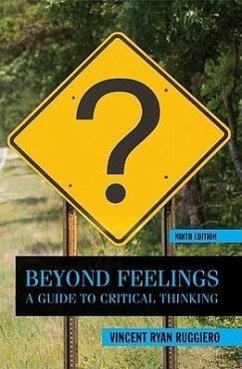
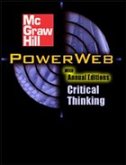
![What Is the Argument?: Critical Thinking in the Real World [With Access to Powerweb Card] What Is the Argument?: Critical Thinking in the Real World [With Access to Powerweb Card]](https://bilder.buecher.de/produkte/21/21309/21309176m.jpg)

